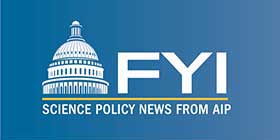Five Science Policy Stories to Watch in 2019
By the FYI Team
A measure of predictability returned to federal science policy in 2018 as Congress decisively rejected the Trump administration’s proposed budget cuts. However, the partial government shutdown that ensued at year’s end serves as a sobering reminder of the current political era’s volatility. In addition, the sudden surge of interest in subjects such as quantum information science and technological competition with China demonstrate just how quickly the science policy landscape can change. Based on current trends, the new year is set to be an eventful one. Here are five stories to watch in 2019.

Budget Battles on Horizon as Spending Caps Return
A deal reached in early 2018 that raised caps on federal spending enabled Congress to provide many science agencies substantial budget increases. Nevertheless, some agencies were caught in the partial government shutdown and uncertainties are likely to deepen because the budget cap deal expires this fall. Congress could agree to keep the caps high, but the budget deficit or other politically volatile issues could make it difficult to strike a new deal, threatening the return of tighter budgets and perhaps further shutdowns.
U.S.–China Tensions Reverberating Across Research Enterprise
The U.S. government embarked on a campaign last year to raise awareness about illegal and legal methods that it alleges the Chinese government uses to obtain foreign technologies. Based on concerns about espionage, the Trump administration also implemented new visa screening measures for Chinese nationals and has reportedly considered more aggressive measures such as putting stricter limits on student visas. It also plans to establish export controls on certain “emerging and foundational technologies.” However, such measures also run the risk of harming the U.S. economy, stifling scientific collaborations, and creating bias against Chinese researchers.
National Quantum Initiative Ramping Up
With the National Quantum Initiative Act now signed into law, federal agencies will work to implement its provisions. The Department of Energy and National Science Foundation will begin to establish between two and five research centers each, and the National Institute of Standards and Technology will convene a consortium of stakeholders to assess research needs. The White House will also stand up a national coordinating office and empanel an advisory committee to oversee the initiative. These activities will build on efforts already underway to establish a national infrastructure of quantum computing testbeds, prototype communication links, and device “foundries.”
Climate Change Back in Spotlight
The release last fall of major climate change assessments brought renewed attention to President Trump’s rejection of the scientific consensus on the subject. Democrats are now making the issue front and center. They have established a “Select Committee on the Climate Crisis” in the House of Representatives, and several other House committees are planning to hold hearings on climate change early this year. There also are signs the political contours of the subject are changing. Some Republicans are now proposing actions such as innovation-centered policy solutions or a carbon tax, while some Democrats are advocating for aggressive action via a “Green New Deal.”
More Action Expected Against Sexual Harassment
Efforts to combat sexual harassment in the sciences that gained momentum last year are set to continue in 2019. Leaders of the House Science Committee have introduced bipartisan legislation that would direct federal science agencies to adopt uniform policies for addressing the problem. The newly confirmed director of the White House Office of Science and Technology Policy, Kelvin Droegemeier, has also expressed support for pursuing a cross-government effort. Meanwhile, scientific societies have been revising their codes of conduct. For instance, the National Academy of Sciences is expected to advance a policy that enables it to expel members.
FYI has been a trusted source of science policy and funding news since 1989, and is read by members of Congress and their staff, federal agency heads, journalists, and US scientific leaders. Sign up for free FYI emails at their website.
©1995 - 2024, AMERICAN PHYSICAL SOCIETY
APS encourages the redistribution of the materials included in this newspaper provided that attribution to the source is noted and the materials are not truncated or changed.
Editor: David Voss
Staff Science Writer: Leah Poffenberger
Contributing Correspondent: Alaina G. Levine
Publication Designer and Production: Nancy Bennett-Karasik
February 2019 (Volume 28, Number 2)
Articles in this Issue

